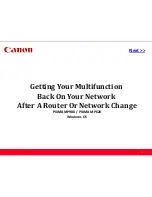
Option
Description
SA (Security Association) is an encrypted communication
method using IPsec or IPv6 that exchanges and shares
information, such as the encryption method and encryption key,
in order to establish a secure communication channel before
communication begins. SA may also refer to a virtual encrypted
communication channel that has been established. The SA
used for IPsec establishes the encryption method, exchanges
the keys, and carries out mutual authentication according to the
IKE (Internet Key Exchange) standard procedure. In addition,
the SA is updated periodically.
Perfect Forward Secrecy (PFS)
PFS does not derive keys from previous keys that were used to encrypt
messages. In addition, if a key that is used to encrypt a message was
derived from a parent key, that parent key is not used to derive other
keys. Therefore, even if a key is compromised, the damage will be
limited only to the messages that were encrypted using that key.
Select
Enabled
or
Disabled
.
Authentication Method
Select the authentication method. Select
Pre-Shared Key
,
Certificates
,
EAP - MD5
, or
EAP - MS-CHAPv2
.
EAP is an authentication protocol that is an extension of PPP.
By using EAP with IEEE802.1x, a different key is used for user
authentication during each session.
The following settings are necessary only when
EAP - MD5
or
EAP - MS-CHAPv2
is selected in
Authentication Method
:
•
Mode
Select
Server-Mode
or
Client-Mode
.
•
Certificate
Select the certificate.
•
User Name
Type the user name (up to 32 characters).
•
Password
Type the password (up to 32 characters). The password
must be entered two times for confirmation.
Pre-Shared Key
When encrypting communication, the encryption key is exchanged and
shared beforehand using another channel.
If you selected
Pre-Shared Key
for the
Authentication Method
, type
the
Pre-Shared Key
(up to 32 characters).
•
Local/ID Type/ID
Select the sender's ID type, and then type the ID.
Select
IPv4 Address
,
IPv6 Address
,
FQDN
,
E-mail Address
, or
Certificate
for the type.
If you select
Certificate
, type the common name of the certificate
in the
ID
field.
•
Remote/ID Type/ID
Select the recipient's ID type, and then type the ID.
Select
IPv4 Address
,
IPv6 Address
,
FQDN
,
E-mail Address
, or
Certificate
for the type.
If you select
Certificate
, type the common name of the certificate
in the
ID
field.
Certificate
If you selected
Certificates
for
Authentication Method
, select the
certificate.
191
Summary of Contents for HL-J6000DW
Page 1: ...Online User s Guide HL J6000DW HL J6100DW 2018 Brother Industries Ltd All rights reserved ...
Page 13: ...Related Topics Near Field Communication NFC 8 ...
Page 17: ... Check the Ink Volume Page Gauge 12 ...
Page 22: ...Related Information Introduction to Your Brother Machine 17 ...
Page 23: ...Home Paper Handling Paper Handling Load Paper 18 ...
Page 38: ... Change the Paper Size and Paper Type 33 ...
Page 41: ... Paper Type and Size for Each Operation 36 ...
Page 194: ...Related Information Configure an IPsec Template Using Web Based Management 189 ...
Page 220: ...Related Information Set Up Brother Web Connect 215 ...
Page 286: ...Related Topics My Brother Machine Cannot Print over the Network 281 ...
Page 299: ... Clean the Print Head from Your Brother Machine 294 ...
Page 308: ...Related Topics Paper Handling and Printing Problems 303 ...
Page 317: ... Change the Print Setting Options When Having Printing Problems 312 ...
Page 373: ...Visit us on the World Wide Web www brother com UK Version 0 ...
















































